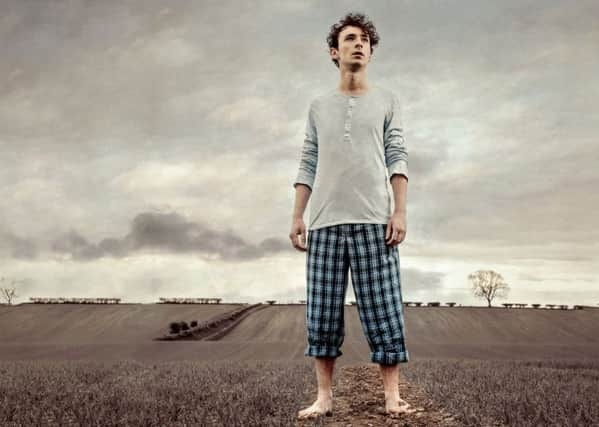Theatre preview: New play Scotties looks at the Kirkintilloch tragedy of 1937 through a 21st century lens


It must be one of the most terse and forthright telegrams ever sent to one government from another. In just four words, in the autumn of 1937, the government of Ireland demanded that Britain “Send home our dead,” marking the start of the final act in a tragic and shameful story – of ten young male farm labourers from a single community in Mayo, burned to death in a locked bothy near Kirkintilloch – that has since been all but wiped from public memory in Scotland, although it is well remembered throughout the west of Ireland. The ten young men, aged between 13 and 23, were all from Achill Island, about 30 miles west of Westport in Mayo; and when Glasgow-based actor and theatre director Muireann Kelly was growing up in Westport in the 1980s, she learned the story as part of local and national history.
“There was this old prophecy about the railway coming to Achill,” says Kelly, “and about how the first and the last trains would carry the dead – and that came true. The very first train out of Achill in 1894 carried the bodies of a boat-load of labourers who died in a capsize while they were waiting in Clew Bay for the steamer to Glasgow; and the last train in 1937, before the final closure of the line, was run specially to bring back the boys who died in the Kirkintilloch disaster. The story had this huge symbolic importance for a part of Ireland where emigration, and the experience of migrant workers, had really dominated our history for large parts of the 19th and 20th centuries.”
Advertisement
Hide AdSo it’s hardly surprising that when Kelly and writer and theatre-maker Catriona Lexy Campbell formed their own company, Theatre Gu Leòr, in Glasgow four years ago, the idea of making a show that would give the Kirkintilloch tragedy its place in Scottish history, and on the Scottish stage, was already high on Kelly’s list of possible projects; and after Theatre Gu Leòr was promoted to regularly funded status in this year’s controversial Creative Scotland funding round, the company moved forward rapidly with plans for an autumn tour of Scotties, Kelly’s play about the Kirkintilloch disaster and its contemporary resonances, co-written with Frances Poet.
“The whole idea of Theatre Gu Leòr is to present new and contemporary drama in the Gaelic language, in a style that reflects the powerful music and storytelling tradition that comes with the Gaelic language,” says Kelly, who learned “school Irish” at home in County Mayo, but has gradually shifted her attention to Scots Gaelic during her long career in Scotland, which began when she arrived as a theatre student more than 25 years ago. “So we never wanted to tell the Kirkintilloch story in a way that was purely historical, or as a drama documentary. Instead, Frances Poet and I decided to look at the story from the point of view of a young contemporary Glasgow lad from a Scots-Irish family rediscovering this part of his own heritage; and we hope that by using songs and storytelling and all four languages – Scots, English, Scots Gaelic and Irish Gaelic – we can bring out its contemporary meanings as well as its historical importance.”
The role of Michael, the Gaelic-speaking 15-year-old Glaswegian at the heart of the story, will be played by Ryan Hunter, who graduated from RADA in London this summer after cutting his theatrical teeth at the legendary Paisley Arts Centre youth theatre PACE, and at Knightswood School in Glasgow. “I think it’s really telling,” says Hunter, “that although I was brought up in a Glasgow family with very strong Irish roots, I just hadn’t heard of this story until Muireann approached me about the show. So this is really the perfect role for me, in my first professional job – coming back to Glasgow, getting my fiddle out again, and telling this story about migrant workers, and all the prejudice and terrible conditions they faced. That’s part of my heritage too, and has so many resonances today. It’s an unsung song, and singing it is something very special to me.”
The project also has a special importance for Kelly, as she seeks to explore the links between Scottish and Irish culture through their linked Gaelic traditions, which she describes as being “like second cousins.” She is delighted that the show has the support of both the National Theatre of Scotland and the Abbey Theatre, Dublin; and she’s certain that there are still issues around the treatment of Irish migrant workers in Scotland that have never been fully acknowledged or resolved. As recently as 2012, when a group including some very elderly survivors placed a small plaque near Kirkintilloch to mark the 75th anniversary of the disaster, Kelly was shocked to find that the plaque was defaced within weeks, and daubed with sectarian slogans.
“Yet despite all the prejudice they experienced, and the harsh conditions,” says Kelly, “people from Mayo who made the migrant journey were still proud of their Scottish connection. They remembered the journey, the landscape, the towns, the songs, the kindness they experienced as well as the problems. There are still pipe bands all over Achill, playing the music of those times. Some of them settled in Scotland; and they all called themselves Scotties, with a kind of defiant pride. That’s why we’ve called the play Scotties; and although it’s a dark piece, we hope some light comes from that – from the songs, from the music, and from that sense of deep connection, despite everything.” n
Scotties is at the Tron Theatre, Glasgow, from 13-15 September, and on tour to Stirling, Inverness, Aberdeen and Edinburgh. There will also be performances on Achill Island, Co Mayo, on 5 and 6 October.